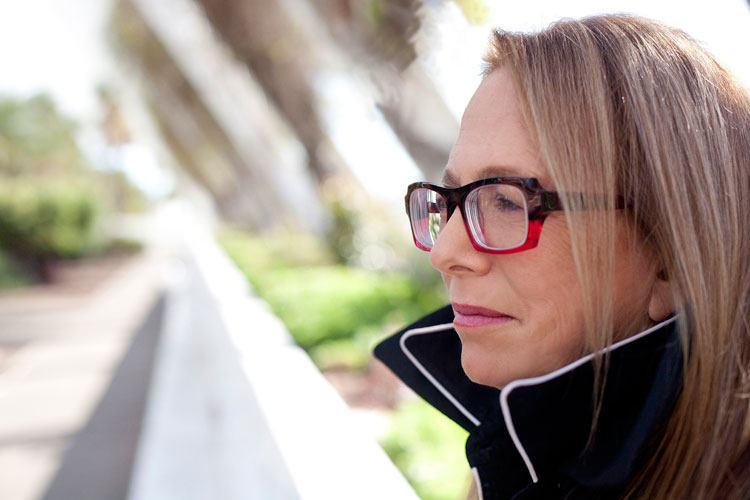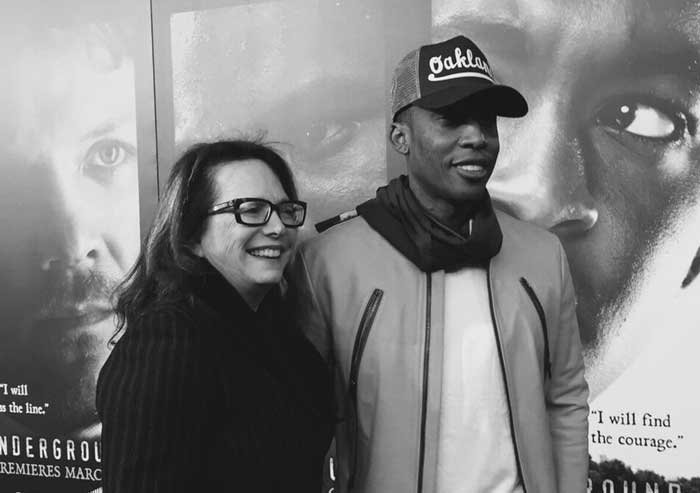
Laura Karpman’s adventurous career spans composing jazz for orchestras and scoring for films and videogames.
(Photo courtesy Laura Karpman)
One of the most original composing talents on the scene today, Laura Karpman has an incredible ability to tailor her inventive style to the needs of whatever project is lucky enough to secure her services. In a field in which women are few and far between, Karpman has maintained a successful career spanning film, television and multimedia. She’s won four Emmys in seven nominations, receiving wide acclaim for her epic orchestral score for Steven Spielberg’s 20-hour series Taken in 2002. Karpman is also a go-to music-maker in the video game world, where women work in even fewer numbers than the composing scene at large. She’s earned awards for her scores for “Everquest 2” and “Kinect Disneyland Adventures,” and anyone who’s heard her imaginative music for 2011’s “Kung Fu Panda 2” can’t help but marvel at what is a tiny miracle of entrepreneurial musicianship (Karpman used a variety of toy and tribal instruments to create a score that manages to be both cost-effective and accessible yet somewhat ethnically exotic).
Last year, Karpman was the driving force behind the two-time Grammy winning Ask Your Mama — the poetry of 1960s Harlem wordsmith Langston Hughes set to a jazzy score composed by Karpman and recorded by the San Francisco Ballet Orchestra. Recently Karpman’s attention has been trained on Underground, the WGN TV series about the underground railroad that debuted in 2016 scored, on which she collaborated with composer Raphael Saadiq. The two re-teamed for director Amanda Lipitz’s Step, a documentary about the “Lethal Ladies of BLYSW” step team as they compete in a showcase at Bowie State University. It’s message of female empowerment is a familiar theme for Karpman, who in 2015 was the founding president of the Alliance of Women Film Composers.
Following its premiere at the Sundance Film Festival the project was acquired by Fox Searchlight, which plans to release it later this year. Karpman’s work can also be heard on director Eleanor Coppola’s narrative feature debut, Paris Can Wait, a May theatrical release from Sony Pictures Classics starring Diane Lane and Alec Baldwin.
MaxTheTrax: You seem to have an unusual circumstance in that Step is all about dancers who use their bodies as sound instruments, did that impact your approach?
Laura Karpman: This project was all about inspiration – and I think all of us were extremely moved by the Girls of the Baltimore Leadership Academy. It was ultimately the sound of their hands, their feet that made the true music in this film.
MaxTheTrax: What was the biggest risk you took to achieve your desired result with this project?
Karpman: I think making a PUSH (Ableton) instrument out of their body sounds and creating grooves was a big chance, and really paid off. We also loved writing the song JUMP that will now become the school song. That feels really good!
MaxTheTrax: At what point were you brought in?
Karpman: We were brought in with a rough cut, and we worked through quite a few picture changes.
MaxTheTrax: What was the setup?
Karpman: We recorded tons of stuff – there was a string ensemble of 16, and guitars, drums, synths, keyboards, a lot of vintage stuff… you name it! The sound was mixed in New York City.
MaxTheTrax: What kind of digital setup or libraries did you use?
Karpman: Protools and Ableton.
MaxTheTrax: Where was this music recorded?
Karpman: At my home studio and Raphael’s massive studio in North Hollywood
MaxTheTrax: On Step you are collaborated with Raphael Saadiq, with whom you also work on Underground which is now starting its second season. Can you talk a little bit as to how, logistically, you two collaborate with each other and also with the series music supervisors, since synch licensing is such a big part of the film’s vibe?

Laura Karpman and Raphael Saadiq have established a fruitful collaboration on the WGN TV series Underground and also shared duties on Step.
Karpman: Yes, we are now on season two of this fantastic show. There is a ton of music both licensed and score. Raphael and I often have a hand in creating songs for the project as well. We work closely with the team, the executive producers
MaxTheTrax: Executive producers that include pop star and actor John Legend. Does he get very involved with the music selection?
Karpman: Yes! He weighs in on all score and music decisions.
MaxTheTrax: And in terms of your collaboration with Raphael?
Karpman: It’s every way you can imagine; sometimes he starts a cue, sometimes I do. Sometimes we are in the room together and other times we work independently. Every cue in the show has a bit of both of us in it and we are constantly bouncing ideas off one another.
MaxTheTrax: What kind of budget did you have to work with on Step?
Karpman: It was a low budget film – we really did this one for love. Its a fantastic film that’s about hope and joy and dancing – all the good things in life.
Karpman: She is truly an astonishing person, making her narrative feature debut at 79. It’s is a lovely, romantic film with a french jazz score that is part Jean Pierre Rampal, part Michel Le Grand, part DJ remix. There are also two songs sung by the great Ute Lemperer.


Comments are closed.